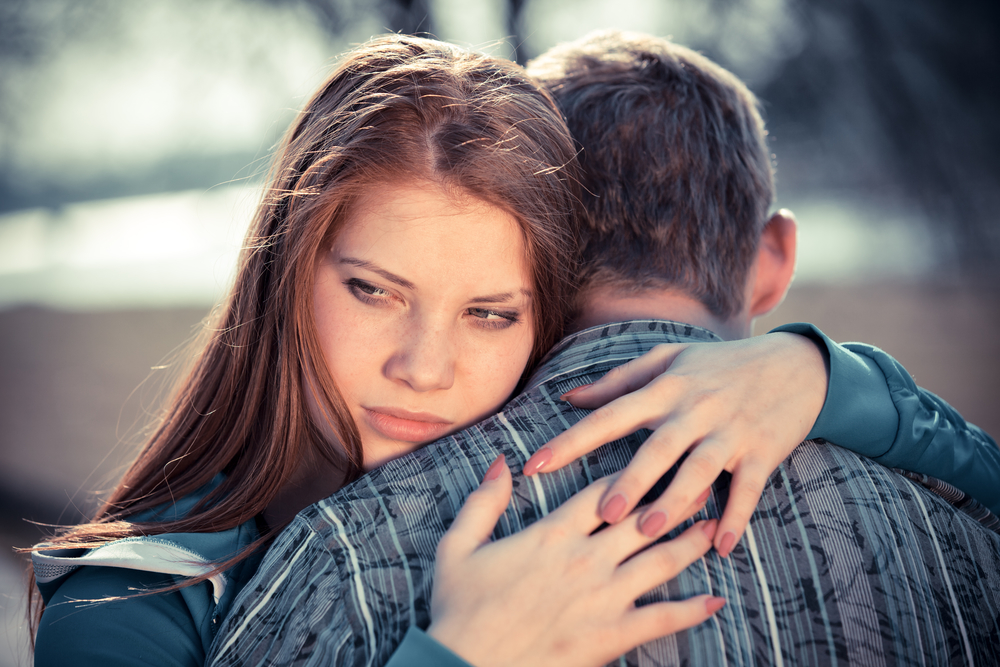
Fear of abandonment in personal relationships
A fear of abandonment is one of those rare emotional issues that begins almost as soon as we’re born. A few seconds after you emerge into this world, you lay eyes on the person you’ve been undeniably connected with physically and emotionally for the last nine months – your mother.
Then the doctors cart you away for testing and suddenly this person that you have a powerful connection with is gone – albeit temporarily. It’s such a traumatic experience for so many that a fear of abandonment never truly goes away, which can spell havoc for just about every relationship you ever have from that point on.
It’s something we all deal with, myself included. Stop me when any of this sounds familiar:
- Has an ex-boyfriend or ex-girlfriend ever told you that you’re a bit too clingy for your own good? That you attach yourself to relationships too fast and too soon? That you force things to “get serious” before both parties are ready?
- Is the opposite true? Do you avoid getting into serious relationships altogether because you feel like getting dumped is not a question of “if” but “when”?
- Do you have a tendency to sabotage your relationships? Even when things seem to be going extremely well, you tend to proactively watch for the other shoe to drop – and find it more often than not?
- Do you look for flaw after flaw in potential romantic connections as a way of ruling someone out before they’ve had a fair chance?
If any – or all – of these things are familiar to you as they are to me, guess what – you have abandonment issues. Deep down inside the very fiber of your being, you fear being rejected so much that you’ve convinced yourself you’re incapable of love.
Related: Abandonment Issues: 7 Symptoms Revealed
Luckily, a fear of abandonment doesn’t mean that at all. It just means that you have some things to work on and honestly, who doesn’t?
If you truly want to get to the root of your abandonment issues and come out all the better for it on the other side, there are a few key things that you’re going to want to pay attention to moving forward.

1. Long History With Abandonment Issues
Abandonment issues are caused by a wide variety of different reasons, but not all of them necessarily have to do with choices you’ve made in the past. Many of them actually have to do with things that you were exposed to throughout your life. As a result, one of the major signs that you might have a fear of abandonment has to do with if any of the following apply to you:
- Your parents got divorced, particularly at an early age.
- You are a child of adopted parents.
- You are a child of alcoholic parents.
- You have a long history of low or non-existent self-esteem.
- Your caretakers, whoever they may have been, were emotionally unavailable.
- You were abused at some point during your childhood.
- You unfortunately lost a parent, a sibling or both.
All of these major factors are huge contributors to abandonment issues manifesting themselves later on in life.
2. You Can’t (Or Won’t) Commit
Another one of the major signs that you have abandonment issues takes the form of your commitment in relationships – or your lack thereof. Many people think that they’re excellent romantic partners because they love the “newness” of a relationship. This is also commonly referred to as the “honeymoon period.” Once that honeymoon is over, however, you tend to find reasons to end things almost immediately.
Related: Signs of commitment issues that might surprise you
This isn’t necessarily the sign of a string of bad luck – it’s a sign that you have abandonment issues that you need to work on.
3. Nobody Can Live Up to Your Standards
There’s nothing wrong with trying to find perfection in mate – so long as you don’t let your expectations get too unrealistic. “Perfect for you” and “literally perfect” are two completely different things and should always be treated as such. Even people in the happiest, healthiest marriages that you could possibly find still have minor disagreements every now and again.
You should never let minor flaws cause you to break things off, which is exactly what a fear of abandonment tends to do.
4. You Think Everyone Is Cheating On You
This is a particularly tricky topic, as it isn’t necessarily founded in something false. Infidelity is a very real thing, but if you constantly feel like EVERY romantic partner you have is cheating on you, you’re probably dealing with something else entirely.
Related: Trust issues and relationships: 7 signs and symptoms
You have a fear of abandonment issues caused by low self-esteem. If you find your justification for your suspicions the idea of “of course this person is cheating on me – why would anyone not cheat on me?” then the problem doesn’t rest with them at all. It rests with you.
5. You Are Your Own Worst Enemy
Another one of the major signs that you have a fear of abandonment is when you can’t seem to get out of your own way and let your relationship play out on its own. Just when things are going along really well, you have a tendency to screw things up.
Maybe you picked a fight over something small and insignificant. Maybe you did the unthinkable and actually cheated on your partner yourself.
This doesn’t make you a bad person – this makes you someone with a solution in search of a problem that needs to be solved in the first place. You have the idea of “this is going to end poorly eventually, so I’m going to end it now on my own terms.”
6. You Can Be Very Controlling
Being a bit on the controlling side in a relationship is one thing – being excessively controlling to the point where you’re essentially dictating how someone can live their life is something else entirely.
Irrationally questioning every small move a person makes isn’t being in a relationship – it’s being in a dictatorship. It’s a major sign of mistrust on your part, which itself is one of the leading signs that you have a deeply rooted fear of abandonment that it is no longer healthy for you to ignore.
7. You Are Often Negative
Another one of the major signs that you have a fear of abandonment actually begins alongside the relationship itself. You meet a great new guy or girl who seems interested, but you can’t help but immediately noticing flaws.
Some of them are small – he or she has an irritating voice or likes a movie that you think is awful. Sometimes they’re big – you don’t like what they do as a job or they have opinions that you very much disagree with.
The problem is that you’re letting them act as barriers that will prevent you from getting more serious with the other person. This all falls back on the idea that you fear getting hurt so badly that you create these artificial “faults” to stay ahead of the game.
This is also related to the unrealistic expectations that you tend to set for potential mates, otherwise known as the “Prince Charming” fantasy.
8. You Become Far Too Attached Far Too Quickly
One of the major signs that you have a fear of abandonment is if you instantly fall head over heels with whoever you meet. As soon as you meet someone you’re “in it for the long haul,” even if you haven’t really gotten a chance to know each other in the first place.
This isn’t “love at first sight” – this is clinginess, which is one of the major ways that people with abandonment issues tend to sabotage themselves.
Related: Signs you may be sabotaging your relationship
In your own head, not only do you get to avoid abandonment by eventually being the one to do the abandoning, but you also create your own “get out of jail free” card. “I didn’t do anything wrong,” you say to yourself. “I was in this 100% from the start.”
In reality, all you’ve done is found another effective way to end your romantic chances before they really had a chance to get off the ground in the first place.
9. You NEVER Allow Yourself to Attach
Unfortunately, the opposite end of the spectrum is also true. If you absolutely NEVER allow yourself to get attached to a relationship, regardless of how perfect the other person may seem, you’re looking at another in a long series of abandonment issues that you would do well to address for the sake of everyone involved.
You may tell yourself that you don’t want to get too serious too quickly. You may tell yourself that you value your single lifestyle and don’t want to commit before you’re ready. What you’re really doing is being emotionally uninvested, which is absolutely NOT how a healthy relationship is formed.
10. Your Fear of Abandonment Isn’t Just Linked to Your Romantic Life
Finally, if you really want to identify signs of abandonment issues, look outside of your romantic pursuits. Say you’re unhappy with your job and really want to make a change, yet you never quite make the effort to polish that resume because the “interview process is a hassle.”
Maybe that’s true, or maybe you don’t want to apply for a job because you don’t want to be rejected.
Maybe you’re creative and you’ve just had an idea for a great short story. You never get down to putting pen to paper, however, because you’re afraid people won’t like it. “It’s better if it just lives inside my head,” you think. “It’s easier that way.”
Or, you don’t want to face the potential rejection along the road to getting that story published.
The fact of the matter is that a fear of abandonment very rarely exists in a silo. It doesn’t JUST affect one area of your life (like your romantic life) while leaving other areas unscathed. It tends to effect EVERYTHING about the life you’re living, often for the negative.
If you start looking outside of your romantic relationships and see signs of abandonment and rejection issues, guess what – it just might explain a thing or two about your ex-girlfriends or ex-boyfriends, too.
Again – absolutely none of this is to say that you are incapable of love or that you’re in some way “broken.” If you are, everyone else is, too. What this means is that you are aware of the artificial barriers that you’re creating for yourself, particularly when it comes to your romantic pursuits.
If the first step to recovery is admitting we have a problem, a simple acknowledgement of these warning signs puts you in the best possible position to actually do something about them moving forward.

Fear of Abandonment Therapy
One of the best ways to get a handle on your abandonment fears is to work with a professional who has experience with anxiety and relationships. While many counselors bill themselves as trained in these kinds of issues, few truly are.
That’s why you want to try and find a professional who has a combination type background and skillset of cognitive therapy (best for anxiety) and relationships. Fears of abandonment are always best explored in individual [one on one] counseling and not couples therapy.
Here’s why:
Working through a fear of abandonment requires special therapeutic approaches that simply aren’t conducive joint therapy sessions. And when you think about it for a moment – that makes sense. Do you really want to reveal deeply held, private relationship experiences that may be traumatic in the presence of your significant other?
Healthy Relationships Video
As a tool for learning and self-insight, we’re publishing an amazing short video on the signs of health relationships. Psychologist Joanne Davila offers her insight in a TED Talk. This is a great tool for learning and to help you better understand your own thoughts, feelings and behaviors in the context of romantic love.
Fears of Abandonment Poll
Below, you will find an unscientific poll that asks you to share how many of the abandonment fears listed here apply to your situation. Be sure to check back from time to time to see how your selection compares to other website visitors.
Fear of Abandonment Myths
We’ve taken the liberty to list out many myths that are associated with a fear of abandonment. How many of these seem familiar to you?
- Fear of abandonment only effects women
- Abandonment fears are unresolved childhood issues
- Abandonment fears mean you aren’t datable
- Emotional abandonment and fears of abandonment are the same
- You can never heal from abandonment fears
- You have to take medications for abandonment fears
- Abandonment fears aren’t related to anxiety or depression
Fear of Abandonment Books
Some people with fears of abandonment are reluctant to attend counseling for a number of valid reasons. Examples include concerns about reopening old wounds to worries about paying for therapy. If this describes you, it might be helpful to opt for bibliotherapy – that’s a 25-cent word for a book that holds a therapeutic benefit.
There are two specific books that we highly recommend you consider that directly speak to abandonment issues. Below we’ve listed them with a short description.

Changing Course: Healing from Loss, Abandonment and Fear
If you have a fear of abandonment, Dr. Black’s book is a must read! Not only does she speak to abandonment issues, she also helps encourage self-healing through activities you can do at home.
The storytelling in her book helps to universalize common experiences shared by people with a fear of abandonment so that shame becomes minimized. What we like best about this book is its ability to empower and transform.
Changing Course is available on Amazon by clicking here

Love Me Don’t Leave Me: Overcoming Fear of Abandonment
This one is perhaps one of our favorites on the topic of abandonment fears. That’s because the book uses tenants from Acceptance and Commitment Therapy: an approach that is designed to help you move past feelings of shame and guilt while encouraging personal empowerment. Great for getting to the root of your fears and enacting real change.
Love Me Don’t Leave Me on Amazon by Clicking Here
Finally, we have several helpful book on the topic of relationships in our bookstore. If you have time, be sure to stop by and see what might speak to your needs.
Wrapping Things Up
If you have a fear of abandonment, it is important to know that you aren’t alone. It’s a challenge that frequently comes up in therapy, impacting women and men alike. Hopefully, the material shared here helped you on your journey towards healing.
Thanks for visiting Couples Counseling Center. Please Like us on Facebook and share on other forms of social media!
—
By: Couples Counseling Center Staff



